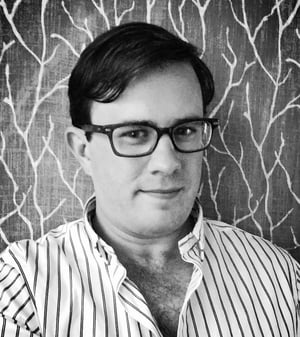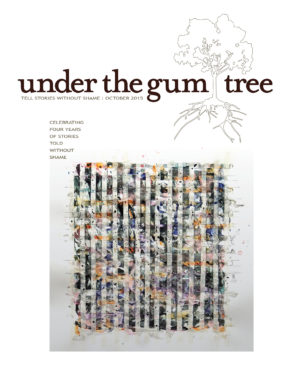Benjamin Winterhalter

Benjamin Winterhalter is a writer, journalist, and former attorney whose work has also appeared in Salon, The Atlantic, The Boston Globe, The Baffler, The Morning News, and PopMatters. His début collection of personal essays is forthcoming in 2016.
When and why did you start writing? What do you enjoy most about writing and how has writing shaped other aspects of your life?
My first article in Salon was published in the fall of 2013. I suppose that marks the beginning of me thinking of myself as a writer in any sort of serious way. I was 27 at the time. I’m 30 now.
I don’t really know why I started writing. I went through this phase where I was reading a lot of narrative nonfiction–David Foster Wallace, Chuck Klosterman, John Jeremiah Sullivan, Sloane Crosley, Tom Wolfe–and decided to try writing in a similar style about topics that interested me. My friend John Harpham, a graduate student at Harvard, suggested I submit this essay I wrote–it was about automated essay grading and the Common Core curriculum–to outlets like Salon and Slate and N+1. I was surprised and delighted when I heard back from Anna North, the culture editor at Salon at the time. Her interest in my work boosted my confidence and inspired me to think I could build a career around something I have always loved doing.
Since then, writing has shaped my life in more ways than I care to think about, partly for fear of re-triggering my nightmares…
I lost my job as an attorney the day after the publication of my first article in The Atlantic. My firm profile got linked in the comments section, and the rest is history.
In general, writing about my real life–especially about sex and relationships–has had a major impact on my real life–especially my sexual relationships. There’s an inherent violence in having someone else tell a story about you. And I think our culture emphasizes shame and self-concealment over truth-telling, especially when the truth is messy and complicated, so people get uneasy about being written about. People in my life have reacted in various ways–both positive and negative–to my writing stories that include them. But I’ve found that it’s deeply cathartic to tell the unfiltered truth–to say what I really believe about my life–and I think that’s what I enjoy the most about it. In other words, writing for me is the process of getting to catharsis–I do a lot of W.W.C. (Writing While Crying). I also just enjoy the kinesthetic and rhythmic experience of it–clickity-clack, clickity-clack–and I usually write with music on. In fact I’m listening to Young Thug right now.
What inspired you to write nonfiction in a world so drawn to the sensationalism of fiction?
To be honest, I never considered doing fiction, though I think you may have just Incepted me. I like that nonfiction has more constraints. I just feel this compulsion to be honest–I think honesty, both intellectual and emotional, has gone missing in the wider culture–so if I were to write fiction, it would probably just end up being a lightly Hollywoodized version of my nonfiction work.
Your writing has been featured in several other publications. What topics do you often find yourself drawn to write about? Are there common themes you tend toward in all your writing?
I’m a culture junkie–political and apolitical, mainstream and indie, high and low, I consume it all. A lot of my early pieces were on issues in education–the death of the humanities and the greed of American law schools–which are issues I feel strongly about on a personal level. But I’ve written essays on a pretty wide variety of topics: Interstellar, hipster sex parties, drinking on college campuses, the Myers-Briggs type indicator, The Bachelor/The Bachelorette. I think contemporary culture is the common thread between those. And yeah, there are definitely some recurring themes and motifs in my stuff. For example, the topics that recur the most in my upcoming collection of essays are sex, music, drugs, and movies, which is to say that I’m writing about love, empathy, pain, and loss.
Throughout your piece published in UTGT, you speak directly to the reader. How do you think breaking down the fourth wall and reaching out to the reader allows the piece to be read differently? Do you think that this contributes to how the reader interprets the message?
From my point of view, the voice on the page is me talking to myself. It’s me examining myself in an attempt to understand why I’m so obsessed with Donnie Darko. In that sense, you could say the breaking-the-fourth-wall technique is my attempt to signal to the reader that I’m inviting them in. It’s like saying, “I know you’re there, come witness the madness,” which is a way of saying, “I’ll show you what it’s really like for me, and I promise to be honest.” Or, maybe more succinctly, “Trust me.”
It is often difficult for writers to manipulate time when they are limited to just a few thousand words. How did you decide on the pacing of the piece? Might you have adjusted the pacing if you had turned this into a longer piece?
I wanted the structure of the essay to resemble the structure of Donnie Darko itself. However, I didn’t write the piece with any particular length or pacing in mind. In retrospect I might have trimmed some of the more tangential sections in the intro and slowed down the ending scene.
It might be worth confessing in this context that I wrote the whole essay in a single 12-hour sitting. I went into in some sort of fugue state, and I was sobbing when I wrote the passage about Mark’s death. That emotional response lead me to think I’d reached the climax, so from there I tried to resolve the remaining threads as economically as possible. I intended for there to be this gradual accumulation of tension followed by a rapid release.
It is clear that oftentimes entertainment becomes much more than mere entertainment. Perhaps it is a particular song or book that speaks to the consumer’s situations. For you it was a movie. Do you feel that you would have connected to Donnie Darko in the same way had it been presented in some other form (i.e. a book or a song with the same plot or themes)?
For me, movies are more immediate and emotional than other art forms–except maybe music–so I think it’s unlikely the story would have been as affecting in a different format.
I do, however, see interrelationships and common themes between different art forms, and I can think of several that evoke the same general mood for me as Donnie Darko. I’m a big fan of The Weeknd and find myself listening to his music a lot around this time of year. Something about the dark sound of an album like Echoes of Silence hits on that same autumnal sadness I talk about in the essay–at least for me. I also think of the soundtrack from the movie itself–like how Joy Division’s “Love Will Tear Us Apart” is playing at the Halloween party while Donnie and Gretchen have sex–but I probably wouldn’t have those associations had I not seen the film, so I suppose that doesn’t count.
You point out a discrepancy between the way you see your “minor infidelity” and Claire’s flirting. How might this relate back to the themes you have pulled from Donnie Darko?
Donnie Darko is about exposing hypocrisy. At the time, I felt Claire’s oh-so-obvious enjoyment of the flirting was pretty strong evidence that her stance on monogamy, especially long-distance monogamy, was hypocritical–clearly I wasn’t the only one with a wandering eye! Now, I was young and drunk and I way overreacted–it’s an embarrassing story in a lot of ways–but I still feel that most people who claim to be good at monogamy are just really repressed.
I’m not saying any of that excuses my cheating–the phrase “minor infidelity” seems a bit callous to me in retrospect–but you might say the whole Claire portion of the essay is an argument against doing long-distance monogamy. It’s intended to raise questions in the reader’s mind about fidelity and commitment and the institution of marriage as a whole.




